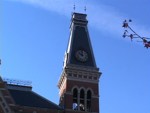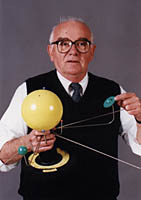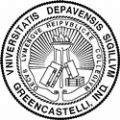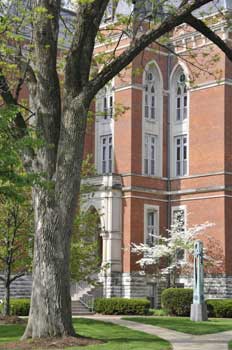Prof. Paul Kissinger to Deliver Commencement Address to 440 Graduates
April 28, 1997
 April 28, 1997, Greencastle, Ind. - A speaker chosen to represent the impact professors have on their students will deliver the address at DePauw University's 158th Commencement on Saturday, May 24. DePauw will award 440 bachelor's degrees in the commencement ceremony at the traditional site on the lawn of East College, beginning at 1 p.m. In addition to recognizing graduating students, three honorary degrees will be presented.
April 28, 1997, Greencastle, Ind. - A speaker chosen to represent the impact professors have on their students will deliver the address at DePauw University's 158th Commencement on Saturday, May 24. DePauw will award 440 bachelor's degrees in the commencement ceremony at the traditional site on the lawn of East College, beginning at 1 p.m. In addition to recognizing graduating students, three honorary degrees will be presented.
Paul Kissinger, a veteran professor of physics and astronomy at DePauw, will give the commencement address. Although DePauw usually has an external speaker at commencement, students particularly requested Professor Kissinger this year.
"The common thing that students on the selection committee agreed on was that what made our experience here valuable was our interaction with professors," Chrissie Coffey, student chair of the commencement committee and a senior English literature major, said. "Faculty members on the  committee thought it was a good idea, too.
committee thought it was a good idea, too.
"Dr. Kissinger has had some of the best student evaluations. Students really get something out of his classes that they can take into their everyday lives. They feel they leave his classroom with more than just a knowledge of physics."
Since joining the DePauw faculty in 1960, Kissinger has been selected an "Outstanding Professor" three times by students, the University's first Alumni Faculty Fellow and was named a Lilly Faculty Fellow and Danforth Foundation Associate in recognition of his teaching and research. In 1991 he received the Mr. and Mrs. Fred C. Tucker Distinguished Career Award which honors senior faculty members for distinguished contributions to the university.
"I really believe that some things are caught, not taught," Professor Kissinger said. "What I think students have caught from their professors at DePauw University is that life can be exciting, that much is expected of them and they must always  try to do the very best they can."
try to do the very best they can."
Kissinger has served as a consultant for the American Institute of Physics, American Association of Physics Teachers, U.S. Departments of Defense and State, Federal Aviation Administration, IBM Corporation and National Science Foundation. An author of several dozen technical and science education papers, Kissinger served as a project director or principal investigator for more than 35 externally supported teaching and research projects around the world.
Honorary degress will be awarded to the following:
- Willis H. "Bing" Davis, who received a B.A. degree at DePauw in 1959 and has gone on to establish himself as an internationally renowned artist and leading force in art education, will receive a Doctor of Fine Arts. He is a professor and chair of the art department at Central State University in Wilberforce, Ohio. Through ceramics, drawing, painting, photography and jewelry design, his art is a mosaic of black culture, both African and American. Davis was one of the pioneers of a Dayton project that later became the national Artists in the Schools Program. In 1985 Davis served as national president of the first international conference of the National Conference of Artists, the largest organization of African-American visual artists. Davis has had more than 50 one-man exhibits, and his works are in both private and public collections around the world. In 1970 he became the first
 full-time African-American art faculty member at DePauw.
full-time African-American art faculty member at DePauw. - Sidney Fine, professor of history at the University of Michigan who began teaching at that university in 1948, will receive a Doctor of Humane Letters. Fine has received the Andrew Dickson White Distinguished Professor of History Award, Distinguished Faculty Achievement Award, a Guggenheim Fellowship, Award of Merit from the Historical Society of Michigan and several other awards for his teaching. Fine has served on the boards of several history journals, including Labor History, and he is the author of 10 books. In 1991 the Michigan state legislature passed a special bill that allowed college and university professors to remain as full-fledged faculty members after the age of 70. Signed by the governor, the bill became known as the Fine Act. Professor Fine continues to teach at the University of Michigan.
- Michael Vogel, who is a native of Czechoslovakia and now resides in Indianapolis, was interned at Auschwitz concentration camp during World War II and was the only member of his family to survive the camps, will receive a Doctor of Public Service. Vogel's father, mother, two brothers and two sisters died in the camps. Before World War II ended, Vogel escaped from the Germans during a march to move the prisoners from the approaching Allies. He joined the U.S. Army, and after the war he came to the United States to be reunited with his one surviving relative, an aunt in Detroit. He has testified against former Nazis in several post-war trials. His efforts to educate students about his experience as a Holocaust survivor were recognized when he was given the national Jefferson Award in 1996.